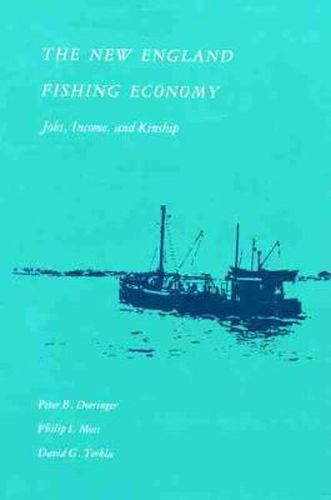Readings Newsletter
Become a Readings Member to make your shopping experience even easier.
Sign in or sign up for free!
You’re not far away from qualifying for FREE standard shipping within Australia
You’ve qualified for FREE standard shipping within Australia
The cart is loading…






This is a book about the fishing industry in New England–its structure, its work, and the way it adjusts to change. It documents the recent economic experience of one of America’s oldest industries, on that has recently been at the center of well-publicized boundary and trade disputes. The study blends customary sources of economic data with field interviews, original survey material, and analyses of economic institutions to provide a timely picture of the industry and its problems. This close examination reveals a rich array of adjustment mechanisms. Of particular interest is the contrast between capitalist, collective bargaining, and kinship practices governing jobs and income in the industry. The authors also present new data on the skills, job attachment, and economic options of workers in key New England ports, particularly Gloucester and New Bedford. The fishing industry is concentrated in economically fragile ports, and the authors show the importance of a strong fishing industry and a growth economy for easing adjustment problems. The study develops a set of innovative recommendations for fisheries management and addresses policies for promoting stabilization and growth in port economies.
$9.00 standard shipping within Australia
FREE standard shipping within Australia for orders over $100.00
Express & International shipping calculated at checkout
This is a book about the fishing industry in New England–its structure, its work, and the way it adjusts to change. It documents the recent economic experience of one of America’s oldest industries, on that has recently been at the center of well-publicized boundary and trade disputes. The study blends customary sources of economic data with field interviews, original survey material, and analyses of economic institutions to provide a timely picture of the industry and its problems. This close examination reveals a rich array of adjustment mechanisms. Of particular interest is the contrast between capitalist, collective bargaining, and kinship practices governing jobs and income in the industry. The authors also present new data on the skills, job attachment, and economic options of workers in key New England ports, particularly Gloucester and New Bedford. The fishing industry is concentrated in economically fragile ports, and the authors show the importance of a strong fishing industry and a growth economy for easing adjustment problems. The study develops a set of innovative recommendations for fisheries management and addresses policies for promoting stabilization and growth in port economies.